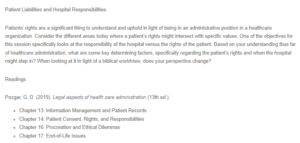Patient’s Right to Refusal of Medical Treatment
A patient who is decisional capable has the right to refuse treatment even when it means the treatment will save his/her life. Hence, such a patient’s refusal to accept the recommended surgical or medical intervention ought to be respected (Pozgar, 2019). It is impermissible to use coercion both ethically and medically because of the prognostic uncertainties, realities and medical knowledge limitations. That said it is unacceptable for physicians to attempt to influence patients in making clinical decisions through coercion. It is critically important to elicit the patient’s lived experience, reasoning, and values when a health practitioner engages with such a patient (Pinals, 2009). Medical expertise can be applied best when the health practitioner strives to gain an understanding of the context within which the decision to refuse medical intervention by the patient is made (Sposato, 2010).
A number of factors need to be considered when seeking to reach a resolution and these include the evidence base’s validity and reliability, the prospective outcome severity, the degree of risk or burden that the patient bears, the extent of the patient’s understanding of the situation’s potential gravity or the involved risk; and the case’s degree of urgency. Ultimately, however, the final decisions rest with the patient and should be upheld (Stirrat et al., 2010).
However, there are three categories of patients who have no legal right to make the decision to refuse treatment, even when it is a matter of a life-threatening injury or illness (Torrey, 2019). These categories of patients include those with altered mental status, children, and a person who is a threat to the community. A person with an altered mental status due to psychiatric illness, brain injury, or use of drugs or alcohol cannot refuse treatment. A parent or a guardian to a child cannot refuse treatment that is life-sustaining or deny the child medical care. This includes decisions made on religious beliefs, and thus, a parent cannot invoke religious freedom rights in refusing a child’s treatment. Lastly, a person who has an illness that is a threat to a community cannot refuse treatment or isolation, such as is the case of a communicable disease. A mentally ill person who is a threat to self or others cannot refuse treatment either (Bingham, 2012)
References
Bingham, S. L. (2012). Refusal of treatment and decision-making capacity. Nursing ethics, 19(1), 167-172.
Pinals, D. A. (2009). Informed consent: Is your patient competent to refuse treatment? Current Psychiatry, 8(4), 33-43.
Pozgar, G. D. (2019). Legal and ethical issues for health professionals. Jones & Bartlett Learning.
Sposato, M. P. (2010). Medical futility. US Army Medical Department Journal, 28-33.
Stirrat, G. M., Johnston, C., Gillon, R., & Boyd, K. (2010). Medical ethics and law for doctors of tomorrow: the 1998 Consensus Statement updated. Journal of Medical Ethics, 36(1), 55-60.
Torrey, T. (2019). Do Patients Have the Right to Refuse Medical Treatment? https://www.verywellhealth.com/do-patients-have-the-right-to-refuse-treatment-2614982
ORDER A PLAGIARISM-FREE PAPER HERE
We’ll write everything from scratch
Question 

Patient’s Right to Refusal of Medical Treatment
Patient Liabilities and Hospital Responsibilities
Patients’ rights are a significant thing to understand and uphold in light of being in an administrative position in a healthcare organization. Consider the different areas today where a patient’s rights might intersect with specific values. One of the objectives for this session specifically looks at the responsibility of the hospital versus the rights of the patient. Based on your understanding thus far of healthcare administration, what are some key determining factors, specifically regarding the patient’s rights and when the hospital might step in? When looking at it in light of a biblical worldview, does your perspective change?
Readings
Pozgar, G. D. (2019). Legal aspects of health care administration (13th ed.).
- Chapter 13: Information Management and Patient Records
- Chapter 14: Patient Consent, Rights, and Responsibilities
- Chapter 16: Procreation and Ethical Dilemmas
- Chapter 17: End-of-Life Issues